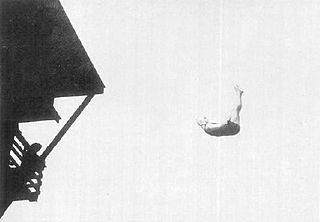
At the 1908 Summer Olympics in London, England, an official football tournament between national representative selections was contested for the first time; football had been played between club teams at the Games of 1900 and 1904.
At the 1908 Summer Olympics, three archery events were contested. Great Britain sent 41 archers, France sent 15, and the United States sent one. Great Britain was the only nation to enter athletes in the women's event, guaranteeing them a medals sweep.

At the 1908 Summer Olympics in London, nine wrestling events were contested, all for men. There were four weight classes in Greco-Roman wrestling and five weight classes in freestyle wrestling.

At the 1908 Summer Olympics, four rowing events were contested, all for men only. Races were held at Henley-on-Thames. The competitions were held from 28 to 31 July. There was one fewer event in 1908 than 1904, after the double sculls was dropped from the programme. Hungary and Norway competed in rowing for the first time, along with six other nations.
At the 1908 Summer Olympics, two gymnastics events for men were contested. No nation was successful in winning more than one medal. No women's competitions were held, though women did participate in non-competitive gymnastic displays.

At the 1908 Summer Olympics, a field hockey tournament was contested for the first time. Six teams entered the tournament: England, Ireland, Scotland, Wales, Germany and France. England won the gold medal, Ireland the silver and Scotland and Wales were awarded bronze medals. All the medals were subsequently credited to Great Britain.

At the 1908 Summer Olympics held in London, England, 26 athletics events were contested, all for men only. A total of 79 medals were awarded.
At the 1908 Summer Olympics in London, six swimming events were contested. These were the first Olympic Games in which a 100-metre pool had been especially constructed. Previous Olympic events were swum in open water. Only men participated in the swimming events. The competitions were held from Monday, July 13, 1908, to Saturday, July 25, 1908.

A diving platform or diving tower is a type of structure used for competitive diving. It consists of a vertical rigid "tower" with one or more horizontal platforms extending out over a deep pool of water. In platform diving, the diver jumps from a high stationary surface. The height of the platforms – 10 metres (33 ft), 7.5 metres (25 ft) and 5 metres (16 ft) – gives the diver enough time to perform the acrobatic movements of a particular dive. There are additional platforms set at 3 metres (9.8 ft) and 1 metre (3.3 ft). Diving platforms for FINA sanctioned meets must be at least 6 metres (20 ft) long and 2 metres (6.6 ft) wide. Most platforms are covered by some sort of matting or non-slip surface to prevent athletes from slipping.
The men's 10 metre platform, also known as the high diving competition, was one of two diving events on the diving at the 1908 Summer Olympics programme, along with the men's 3 metre springboard. The competition was held from Monday 20 to Friday 24 July 1908. Twenty-four divers from six nations competed. Each nation could enter up to 12 divers.
The men's 3 metre springboard, also known as the fancy diving competition, was one of two diving events on the Diving at the 1908 Summer Olympics programme, along with the men's 10 metre platform. The competition was held on Tuesday 14 and Saturday 18 July 1908. Twenty-three divers from eight nations competed. Each nation could enter up to 12 divers.

Diving was first introduced in the official programme of the Summer Olympic Games at the 1904 Games of St. Louis and has been an Olympic sport since. It was known as "fancy diving" for the acrobatic stunts performed by divers during the dive. This discipline of Aquatics, along with swimming, synchronised swimming and water polo, is regulated and supervised by the International Swimming Federation (FINA), the international federation (IF) for aquatic sports.

At the 1932 Summer Olympics in Los Angeles, four diving events were organized, two for men, and two for women. The competitions were held from Monday, 8 August 1932 to Saturday, 13 August 1932.

At the 1912 Summer Olympics in Stockholm, four diving events were contested. For the first time, women competed in diving at the Olympic Games. The competitions were held from Saturday 6 July 1912 to Monday 15 July 1912.

At the 1920 Summer Olympics in Antwerp, five diving events were contested. The women's 3 metre springboard competition was added to the Olympic programme. The competitions were held from Monday, 22 August 1920 to Monday, 29 August 1920.

At the 1924 Summer Olympics in Paris, five diving events were contested. The competitions were held from Monday, 14 July 1924 to Sunday, 20 July 1924.

At the 1928 Summer Olympics in Amsterdam, four diving events were contested. The men's plain high diving event was dropped from the Olympic program. The competitions were held from Monday, 6 August 1928 to Saturday, 11 August 1928.

At the 1948 Summer Olympics in London, four diving events were contested. The competitions were held from Friday 30 July 1948 to Friday 6 August 1948.

Albert Zürner was a German diver who competed in the 1906 Summer Olympics, in the 1908 Summer Olympics, and in the 1912 Summer Olympics.
Gottlob Walz was a German diver who competed in the 1906 Intercalated Games and 1908 Summer Olympics.









